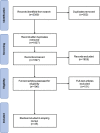Impacts of colonization on Indigenous food systems in Canada and the United States: a scoping review
- PMID: 37885000
- PMCID: PMC10601184
- DOI: 10.1186/s12889-023-16997-7
Impacts of colonization on Indigenous food systems in Canada and the United States: a scoping review
Abstract
Background: Indigenous populations in Canada and the United States (US) have maintained reciprocal relationships with nature, grounded in respect for and stewardship of the environment; however, disconnection from traditional food systems has generated a plethora of physical and mental health challenges for communities. Indigenous food sovereignty including control of lands were found to be factors contributing to these concerns. Therefore, our aim was to conduct a scoping review of the peer-reviewed literature to describe Indigenous disconnection from Indigenous food systems (IFS) in Canada and the US.
Methods: Following the Preferred Reporting Items for Systematic Reviews and Meta-Analyses for Scoping Reviews (PRISMA-SR) and Joanna Briggs Institute guidelines, we searched MEDLINE, SCOPUS, International Bibliography of the Social Sciences, Sociological Abstracts, and Bibliography of Native North Americans. Data was extracted from 41 studies and a narrative review completed based on study themes.
Results: The overarching theme identified in the included studies was the impact of colonization on IFS. Four sub-themes emerged as causes for Indigenous disconnection from traditional food systems, including: climate change; capitalism; legal change; and socio-cultural change. These sub-themes highlight the multiple ways in which colonization has impacted Indigenous food systems in Canada and the US and important areas for transformation.
Conclusions: Efforts to reconnect Indigenous knowledge and values systems with future food systems are essential for planetary health and sustainable development. Traditional knowledge sharing must foreground authentic Indigenous inclusion within policymaking.
Keywords: Canada; Climate change; Colonization; Food security; Food sovereignty; Food systems; Indigenous; United States.
© 2023. The Author(s).
Conflict of interest statement
The authors declare no competing interests.
Figures
References
-
- Martinez Cobo J. Problem of Discrimination Against Indigenous Populations. 1986. E/CN.4/Sub.2/1986/7/Add.4,para.379. https://cendoc.docip.org/collect/cendocdo/index/assoc/HASH01a2/55590d02.....
-
- Drissi S. Indigenous peoples and the nature they protect. U N Environ Programme n.d. https://www.unep.org/news-and-stories/story/indigenous-peoples-and-natur.... Accessed 26 Apr 2022.
-
- Oneida Indian Nation. The Haudenosaunee Creation Story - Oneida Indian Nation n.d. https://www.oneidaindiannation.com/the-haudenosaunee-creation-story/. Accessed 24 Apr 2022.
-
- Salmon E. Kincentric ecology: indigenous perceptions of the human-nature relationship. Ecol Appl. 2000;10:1327–1332. doi: 10.1890/1051-0761. - DOI
-
- The World Bank. Indigenous peoples overview. n.d. https://www.worldbank.org/en/topic/indigenouspeoples#1 . Accessed 26 Apr 2022.
Publication types
MeSH terms
LinkOut - more resources
Full Text Sources
Medical
Research Materials



